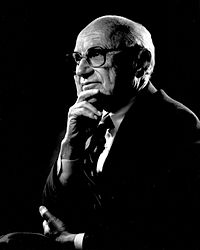Milton Friedman (July 31, 1912 – November 16, 2006) was an American economist, statistician, and author who taught at the University of Chicago for more than three decades. He was a recipient of the Nobel Memorial Prize in Economic Sciences, and is known for his research on consumption analysis, monetary history and theory, and the complexity of stabilization policy. As a leader of the Chicago school of economics, he influenced the research agenda of the economics profession. A survey of economists ranked Friedman as the second most popular economist of the twentieth century behind John Maynard Keynes, and The Economist described him as "the most influential economist of the second half of the 20th century…possibly of all of it. " Friedman's challenges to what he later called "naive Keynesian" (as opposed to New Keynesian) theory began with his 1950s reinterpretation of the consumption function, and he became the main advocate opposing activist Keynesian government policies. In the late 1960s he described his own approach (along with all of mainstream economics) as using "Keynesian language and apparatus" yet rejecting its "initial" conclusions. During the 1960s he promoted an alternative macroeconomic policy known as "monetarism". He theorized there existed a "natural" rate of unemployment, and argued that governments could increase employment above this rate (e.g. , by increasing aggregate demand) only at the risk of causing inflation to accelerate. He argued that the Phillips curve was not stable and predicted what would come to be known as stagflation. Though opposed to the existence of the Federal Reserve, Friedman argued that, given that it does exist, a steady, small expansion of the money supply was the only wise policy. Friedman was an economic adviser to Republican U.S. President Ronald Reagan. His political philosophy extolled the virtues of a free market economic system with minimal intervention. He once stated that his role in eliminating U.S. conscription was his proudest accomplishment, and his support for school choice led him to found The Friedman Foundation for Educational Choice. In his 1962 book Capitalism and Freedom, Friedman advocated policies such as a volunteer military, freely floating exchange rates, abolition of medical licenses, a negative income tax, and education vouchers. His ideas concerning monetary policy, taxation, privatization and deregulation influenced government policies, especially during the 1980s. His monetary theory influenced the Federal Reserve's response to the 2007–2012 global financial crisis. Milton Friedman's works include many monographs, books, scholarly articles, papers, magazine columns, television programs, videos, and lectures, and cover a broad range of topics of microeconomics, macroeconomics, economic history, and public policy issues. His books and essays were widely read, and have had an international influence, including in former Stalinist states.

Fecha de nacimiento
1912-07-31
Fecha de defunción
2006-11-16
Numero individualizado del archivo de la Biblioteca Nacional Alemana
118535625



Comentar
0